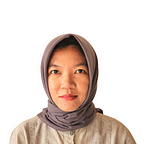Study on the happiness of Indonesian Millennials
This is a writing on the experience of conducting research for my master thesis. It all started mid-2019 where I suddenly feel the urge to complete my master's study, which I have been postponing for some years. Long story short, after the university confirmed for my re-enrollment, I’m starting to direct my focus on finding a research topic, while still working full-time. After a couple of correspondence with the professor at the university, it is decided that I’m focusing the research on the subjective well-being of Indonesian Millennials, taking into account their active participation in communities.
Knowing that I only have one semester to complete the study, I put some effort into the preparation, simply because I want to accomplish everything on time. Thus, I decided to quit my full-time job, three months before the actual enrollment. One of my main concerns was to get a head start with the research project because I was planning to collect my own data. This was quite a process, from reaching out to more than 1000 people through email and social media to attending events where I can approach people that fit the criteria to be the research respondents. In the end, I collected more than 300 respondents to work on the research.
Aside from the interesting experience with regard to the technical aspects, I also found some meanings when working on the substance of the research. The main motivation for conducting this research is that I want to know the state of mind of the millennials, an age group/generation of which I am also part. Looking from a broad perspective, we are living in quite challenging times, with major concerns related to climate change and economic disruptions (this was even before the global pandemic hits). Some are lucky to have secured jobs and other privilege attributes that can help them advance in societies, while some others are barely surviving on a day to day basis. But what interesting is how some people belonging to this generation are very well connected with each other (especially with the presence of technology and the internet) and are motivated to make difference to help solve issues in their communities by leveraging their talents, skills, networks, etc. Being an Indonesian citizen, I think these are important resources to help the nation moving forward. From the theoretical perspective, being happy millennials does not necessarily mean living challenge-free life, instead happiness coming from the endurance of overcoming these challenges. This group of individuals has its own challenges given the externals circumstances in our societies. From the pool of people included in this study, it is concluded that in general, they have high subjective well-being, which makes me quite hopeful yet curious about how things will unfold for in the upcoming years.
I understand this research still contributes a small significance in the whole discussion on the Indonesian millennials and work of improvements are needed in some parts of the research, but hopefully, it could give some insights around the topic being discussed. For myself, it has been throughout journey of acquiring knowledge and would like to consider it as another (major) step in my lifelong learning process. Even though this project has been an individual pursuit, the execution involved a great deal of collective work. And I’d like to thank everyone that has been part of this particular journey. For the research summary, kindly access the following link https://bit.ly/32DA0kt
